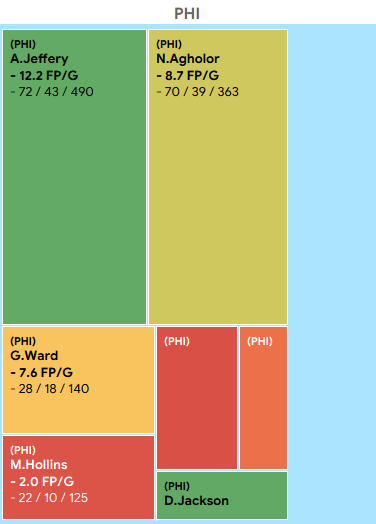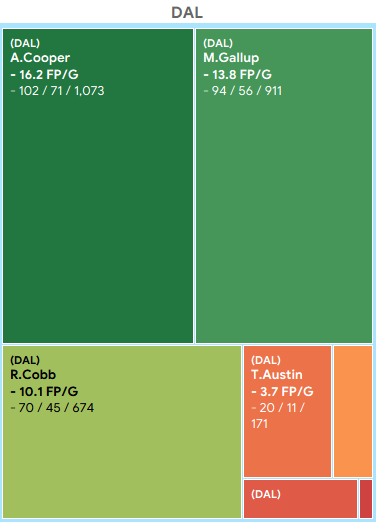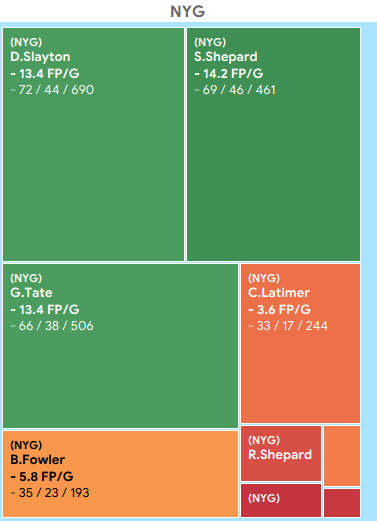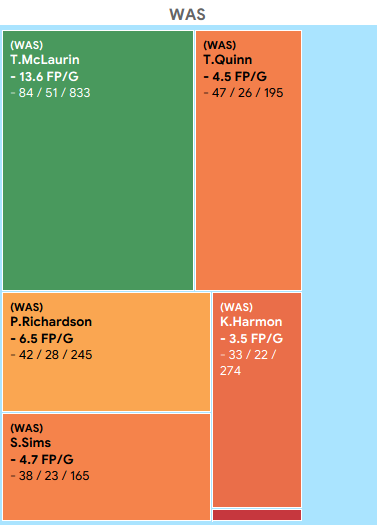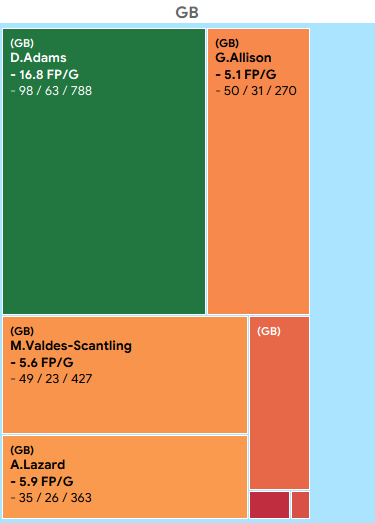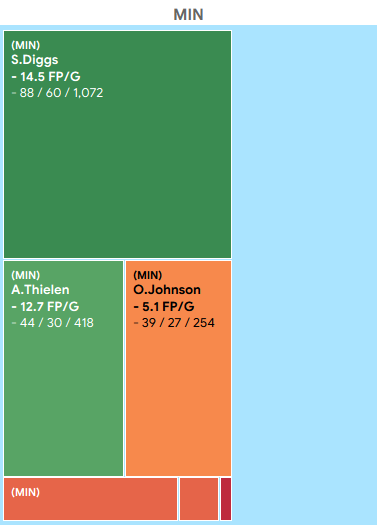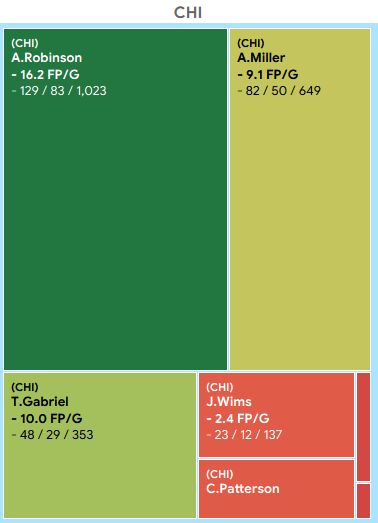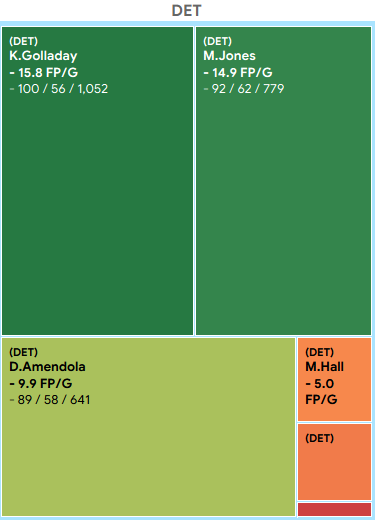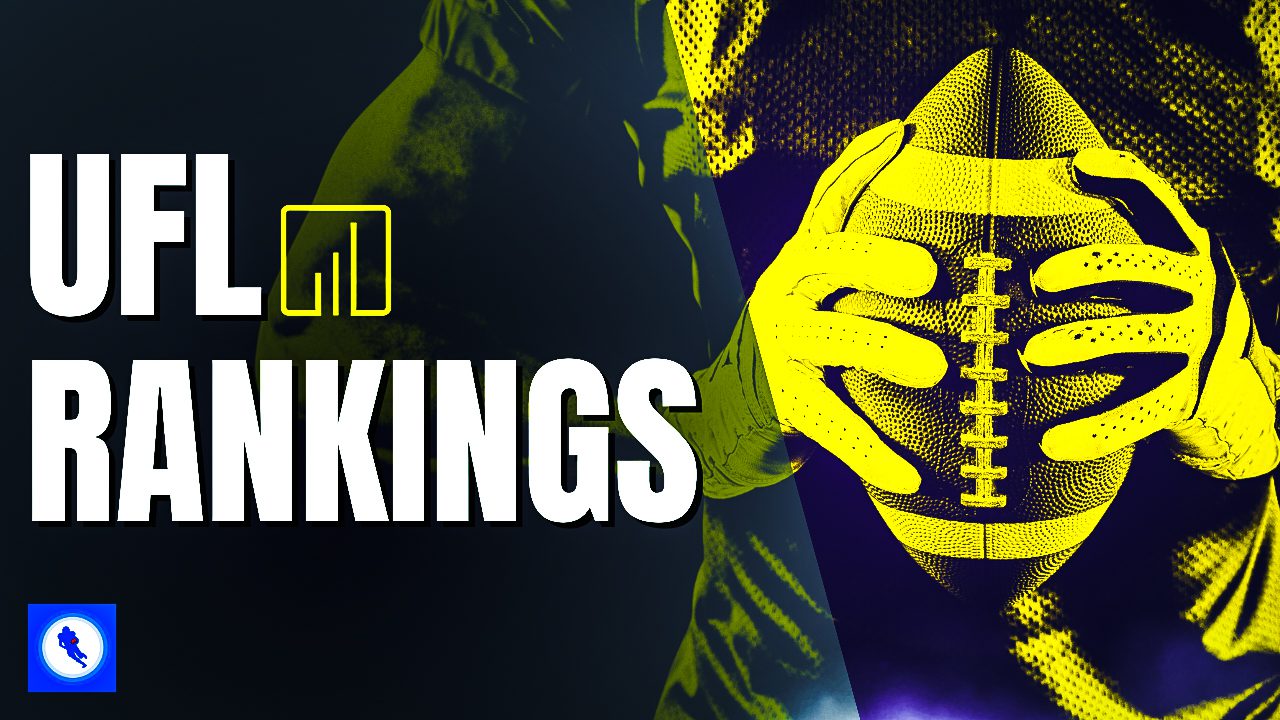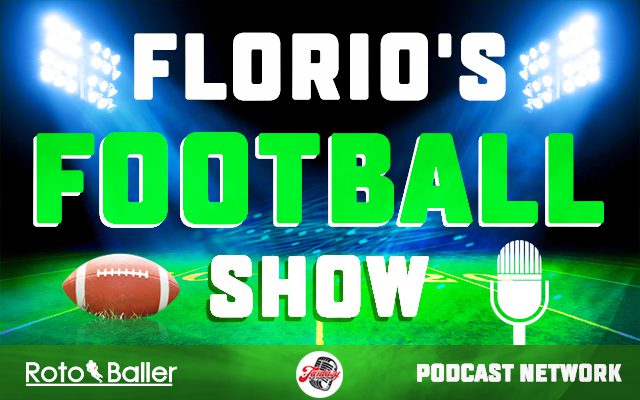Antonio Losada looks at last season's wide receiver usage and fantasy impact for each of the 32 NFL teams. He tackles both the NFC East and NFC North franchises this time around.
We continue this series in which I will be covering each of the eight NFL divisions, two at a time, presenting the teams and how they used their wide receivers in 2019. In order to accomplish this, I use a set of easy-to-read charts: treemaps.
The graphics will hold all of the players of each team, the size of each box corresponding with the number of targets (percentage among teammates) he received during the season and the color related to the fantasy points per game (PPR-format leagues) he finished with at the end of the year. Also, the width of the full graphic represents how many total targets (combining those of every receiver) were thrown to receivers by the team compared to the rest of the teams in the division (the empty space in blue to the right, the fewer passes were thrown by such team).
Just to clarify things, I will add analysis on each team and how they performed in terms of WR usage and impact during the 2019 season. Let's break things down, this time covering the NFC East and NFC North teams.
Be sure to check all of our fantasy football rankings for 2025:- 2025 fantasy football rankings (redraft)
- Dynasty fantasy football rankings
- 2025 NFL rookie fantasy football rankings
- Best ball fantasy football rankings
- Quarterback fantasy football rankings
- Running back fantasy football rankings
- Wide receiver fantasy football rankings
- Tight end fantasy football rankings
- Philadelphia Eagles
- Considering the amount of health-related problems Philly went through, it is an actual feat to find them ranked "only" eighth-worst in total targets to WRs.
- As Zach Ertz's numbers are not part of this equation, both Alshon Jeffery and Nelson Agholor went away with the highest and similar target shares of 30.6% and 29.8% respectively. The outcomes, though, varied wildly.
- On a similar usage, Jeffery outperformed Agholor by far, averaging 3.5 more FP/G than the latter and giving the Eagles 34.9% of the FP generated by receivers. With that in mind, it should be expected to see Jeffery rack significantly more targets than his counterpart next season assuming Agholor re-signs.
- J.J. Arcega-Whiteside finished the year as the WR5 in opportunities (8.5% target share) but he did more than WR4 Mack Hollins. The rookie should get a bump in targets as a second-year pro.
- Dallas Cowboys
- Spot-on target shares those of the Cowboys, with both usage percentages and production aligning nicely.
- The difference between Amari Cooper and the rest of the receiving corps in total points was high (Cooper generated 37.2% of the total FP) but the FP/G tell a much tighter story.
- The target shares went 33.6%, 30.9%, and 23% for the WR1/2/3 of the team and the point shares finished at 37.2%, 27.2%, and 21.6% making it all work to perfection.
- We'll see if Devin Smith jumps over Tavon Austin in the pecking order next season, considering the higher FP/G (5.6) of the latter over the former (3.7).
- New York Giants
- The Giants used a lot of WRs during the year and ranked just middle-of-the-pack in FP per target at 1.75.
- There was a pretty even target share between the top-three receivers of the team, more due to injuries and missed games throughout the year than anything. Darius Slayton had a 24.5% share, Sterling Shepard a 23.5% and Golden Tate a 22.4%.
- The total point share, though, calls for a change in the pattern. Slayton was the clear No. 1 producer with 31.3% of the points coming his way, but Tate produced 1.4% more points than Shepard.
- Washington Redskins
- Terry McLaurin lived on an island this season, both in terms of target share and points production. He had a 34.1% target share that finished 15-percentage points over second-highest Trey Quinn and got 42.8% (!) of the total points generated by Washington's receiving corps (the 11th-highest mark in the league).
- Washington wouldn't be crazy to bump up Paul Richardson's targets next season as he clearly outperformed both Trey Quinn and Steven Sims in way fewer games played.
- No matter what, Washington better ramp up their efforts and bring some enforcements to town or McLaurin will have a tougher time each game with him being the lone viable option of this offense.
- Green Bay Packers
- It is incredible how far Aaron Rodgers got the Packers considering the horrific receivers he had to work with overall.
- Davante Adams was both the only reliable weapon this season in Green Bay. He finished with a massive target share of 38.7% and FP share of 38.4%.
- Geronimo Allison finished with the second-highest target share but both Marquez Valdes-Scantling and Allen Lazard out-performed him in FP/G and total point share.
- Even if all of those non-WR1s step up, Green Bay better bring some new blood to the corps if they want to keep it up next season.
- Minnesota Vikings
- Laugh all you want at the low number of passes thrown to WRs by Minnesota, but the Vikings receivers averaged a league-leading 2.29 FP per target (San Francisco was second at 2.10).
- With Adam Thielen out injured for quite some time, it was Stefon Diggs who racked up numbers. He finished logging 46.8% of the targets and getting 47.2% of the team's total fantasy points.
- In just nine games, Thielen had the second-highest target share (23.4) and the second-best production (26.5% FP share) and FP/G.
- Chicago Bears
- Allen Robinson was clearly the leading man of this offense, with a great 42.7% target share only relatively approached by Anthony Miller's 27.2%.
- The most interesting takeaway from this data is the fact that in five fewer games Taylor Gabriel finished with 17.6% of the total points generated by WRs while Miller had 24.7% in 14 matches. It'd be nice -- and I expect it to happen -- to see Gabriel jump over Miller in usage next season.
- Robinson's 44.3% FP share was the ninth-highest in the league, on par with that of Julian Edelman (can you name any other Patriots receiver? No? That proves how one-man-geared Chicago's offense was).
- Detroit Lions
- Not a lot of interesting stuff going on in Detroit. Kenny Golladay and Marvin Jones did what they were expected to achieve. Both had pretty similar target shares (32.9% and 30.3% respectively) and produced virtually the same points (36% and 31.6% with the difference coming down to Jones playing one fewer game).
- Danny Amendola's target share of 29.3% was a little baffling, though, almost the same as that of Golladay and Jones but on a much worse production-rate (20.9% of the points and only 9.9 FP/G).
- The rest of the receivers did next to nothing, so we'll see if Detroit brings something to the corps this offseason.
More Fantasy Football Analysis
 RADIO
RADIO








